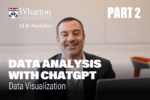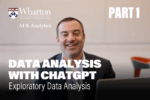
When Penn Vet joined the Wharton AI & Analytics Accelerator in Fall 2025, the goal was clear but ambitious: make better use of years of client and hospital data to strengthen engagement, fundraising, and long-term strategy. For Chase Engel, Assistant Director of Annual Giving, and Sarah Trout, Associate Director of Advancement Services, the Accelerator offered a rare opportunity to step back from day-to-day operations and ask deeper, data-driven questions about how Penn Vet connects with its community.…Read More











